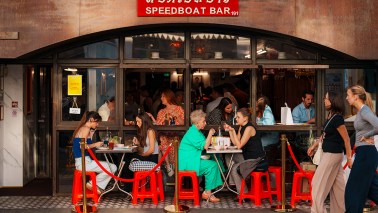One ‘bridge too far’ should have been enough, but it looks to me as if Michael Gove has already embarked on a second one with his new plan to tackle obesity in schools. Despite having been forced to drop his cherished proposal for an ‘English baccalaureate’, the Education Secretary is reported to be preparing to tell young schoolchildren what they are allowed to eat and what they aren’t, and to compel them to take lessons in cookery. The resistance, I predict, will be at least as formidable as that of the teachers and civil servants who sank the baccalaureate project. For without resorting to totalitarian measures, it is almost impossible to get children to eat things they don’t like and to forego things they do like, especially as their parents usually share their unhealthy preferences.
If people imagine that the popularity of television chefs means that the average housewife now spends her evenings drizzling extra virgin olive oil on sundried tomatoes, they are deluded. She is more likely to be putting a frozen burger of uncertain provenance into the microwave. The fact that millions find entertainment in the sight of Nigella Lawson licking her lips or of Gordon Ramsay abusing restaurant staff doesn’t mean that they want to start cooking exotic foreign dishes, or even go out to eat them in restaurants. My home in south Northamptonshire is less than 70 miles from London, but the food revolution has yet to arrive here. There are no decent restaurants in the neighbourhood, apart from the odd Indian or Chinese, and no ‘gastro-pubs’. This is a gastronomic wasteland, in which a Findus horsemeat lasagne would probably be considered rather a treat.
The proposals that Gove plans to implement come from the founders of the Leon restaurant chain, Henry Dimbleby and John Vincent, whom he commissioned to write a report on children’s eating habits, and they follow the failure of Jamie Oliver’s efforts a few years ago to put schoolchildren on healthier diets. His method was to persuade schools, with some success, to serve them healthier meals — bouillabaisse, as it were, instead of turkey twizzlers — but the result was a widespread boycott of school food. The number of children eating school meals fell so dramatically that it has now reached an economically unviable 40 per cent, with most children bringing packed lunches from home or going out to fast food cafés. English children meanwhile remain among the fattest in the developed world, with between one quarter and one third of them officially qualifying as obese.
In their fierce resistance to eating anything good for them, the rebellious majority of English children are aided and abetted by their parents, who have sometimes been photographed during lunch breaks pushing junk food through school fences as if it were feeding time at the zoo. Since these children get fed the same kind of rubbish at home, it is hardly surprising that they greatly prefer it to anything else; just as Italian children, who are fed healthily and nutritiously at home, love the meals including lots of fresh fruit and vegetables that they are served at school. So how will Gove manage to overcome the huge forces of opposition from those who don’t really want to consume anything except burgers, chips, sweets, cakes, biscuits and fizzy drinks?
One suggestion is that schools should ban packed lunches and lunchtime visits to fast food outlets so that children would either have to eat in the school canteen or starve. ‘What we need to do is lift uptake from 40 per cent to 80 per cent over five years so as to make school meals solvent again,’ says Henry Dimbleby. But he seems to be admitting that this can only be achieved by a degree of compulsion never before contemplated and likely to provoke far greater resistance than anything endured by Jamie Oliver. Almost as provocative is Dimbleby’s fallback idea that teachers, like airport security people, should at least police the contents of packed lunches and throw away all sweets, crisps and fizzy drinks. Imagine what mothers would say about that!
The main proposal, however, and one that Gove looks set to adopt, is that all children between the ages of 7 and 14 will be taught how to cook in school, with the hope that by the time they are 14 they will have mastered some 20 different dishes. Twenty! That’s a lot. I have been cooking for years, but I doubt if I could manage so many without reference to a cookery book. And imagine the mess and the squalor and the danger involved in letting loose so many seven-year-olds in so many kitchens. And, anyway, who will teach the teachers to teach anything other than how to put a frozen burger in a microwave oven?





Comments